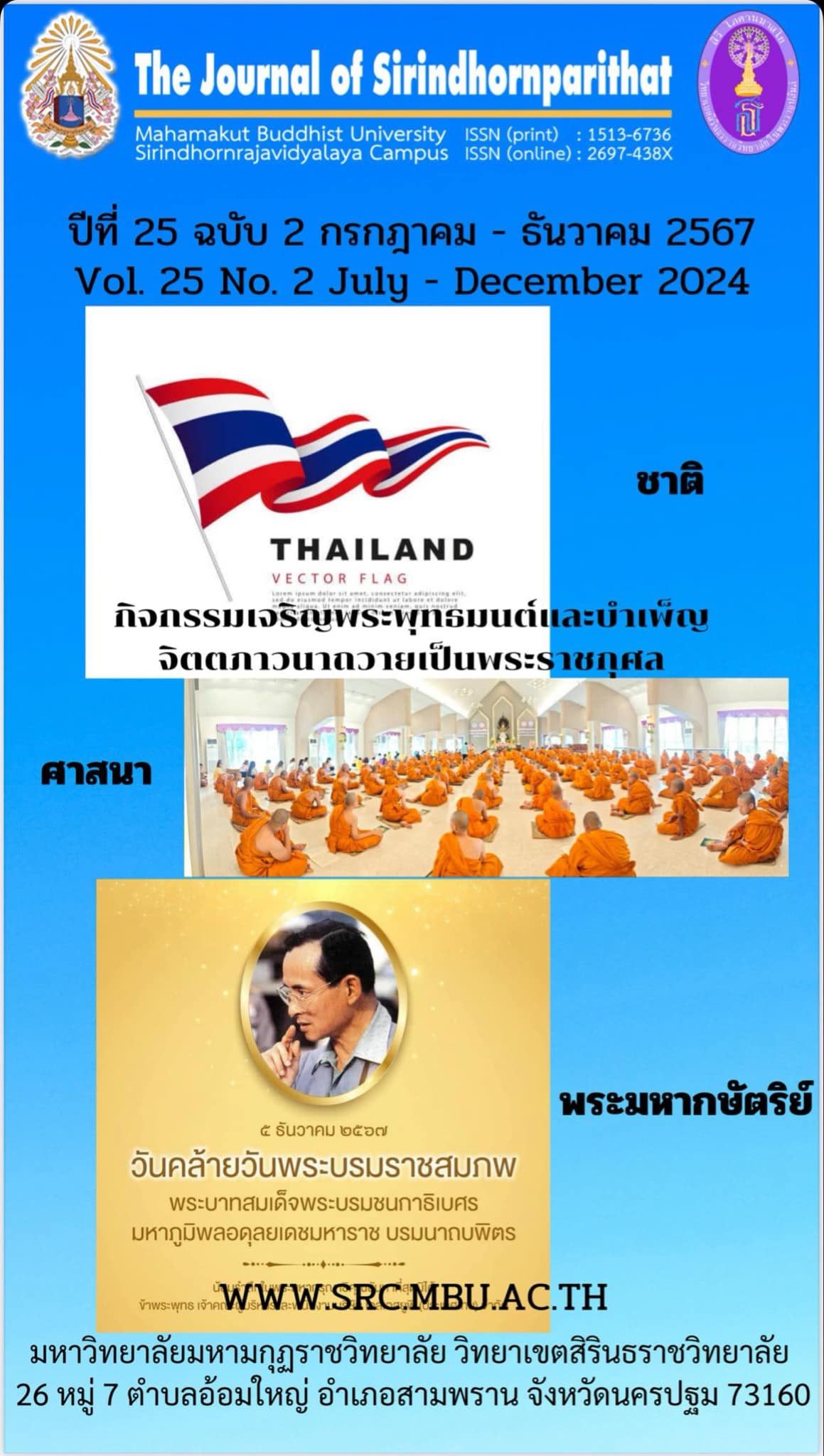Guidelines for enhancing organizational commitment of government teachers under the Institute of Vocational Education Central Region 4
Keywords:
vocational institute, organizational commitmentRemove organizational commitmentAbstract
This research aimed to: 1) investigate the level of organizational commitment of government teachers; 2) compare the level of organizational commitment of government teachers classified by gender, age, educational level, work tenure, salary, and type of subject; and 3) identify the guidelines to strengthen organization commitment. The sample was 234 government teachers from the Institute of Vocational Education Central Region 4, derived by proportional stratified random sampling as distributed by institutes. The instrument was a questionnaire constructed by the researcher. Data were analyzed with percentage, mean, standard deviation, t-test, one-way analysis of variance, and content analysis
The research results were as follows: 1. Overall and in specific aspects, the organizational commitment of government teachers was at a high level. The aspects consisted of teachers exerting extra time, effort and initiative to contribute to the success of the schools; teachers having an intense desire to be a member of the organization; and teachers advocating for the organization to co-workers. 2. The government teachers classified by gender, age, and type of subject had different organizational commitment with statistical significance at the .05. However, there was no difference in organizational commitment in general when classified by level of education, work tenure, and salary of teachers. 3. The guidelines for enhancing the organizational engagement of government teachers in vocational colleges consisted of advocating for the college to co-workers, having an intense desire to be a member of the college, and exerting extra time, effort, and initiative to contribute to the success of the college. In conclusion, the administrators should have good organizational policies aiming in the same direction and setting clear goals for every person to participate and take action, and encouraging good team working. Teachers must recognize their own values and abilities, build a good conscience towards their duties and workload, have confidence in the management, and sincerely listen to opinions or suggestions of others. The organization should organize activities to build good relationships between administrators, teachers, and personnel so that they can make acquaintance with each other and create organizational unity. The administrators should boost morale and motivation by providing good welfare for subordinates with prioritization of service user benefits over partisan advantage.
References
กนกวรรณ แอ่นศรี. (2555). ความผูกพันต่อองค์การของบุคลากรทางการศึกษากลุ่มโรงเรียนเพชรจินดา สังกัดสำนักงานเขตพื้นที่การศึกษาประถมศึกษานครปฐม เขต 2. วิทยานิพนธ์บริหารธุรกิจมหาบัณฑิต สาขาวิชาการจัดการทั่วไป บัณฑิตศึกษา มหาวิทยาลัยราชภัฏนครปฐม.
จิตติรัตน์ แสงเลิศอุทัย. (2555). วิธีวิทยาการวิจัยทางการศึกษา. นครปฐม: คณะครุศาสตร์ มหาวิทยาลัยราชภัฏนครปฐม.
จิระพร จันทภาโส. (2558). ความผูกพันต่อองค์การของข้าราชการครูและบุคลากรทางการศึกษาในวิทยาลัยเทคนิคหาดใหญ่ จังหวัดสงขลา. สารนิพนธ์บริหารธุรกิจมหาบัณฑิต สาขาวิชาบริหารธุรกิจ บัณฑิตวิทยาลัย มหาวิทยาลัยหาดใหญ่.
ณัฐพัฒน์ มงคลวรกิจชัย. (2559). การนำองค์กรของผู้บริหารกับความผูกพันของครูและบุคลากรทางการศึกษาที่มีประสิทธิภาพในการทำงานสูงของโรงเรียนในเครือมูลนิธิคณะเซนต์คาเบรียลแห่งประเทศไทย. วารสารการพัฒนาทรัพยากรมนุษย์และองค์การ. 8(1): 75-101.
ทวีวัฒน์ จิตติเวทย์กุล. (2557). ความผูกพันต่อองค์การของข้าราชการครูและบุคลากรทางการศึกษา สำนักงานอธิการบดี สถาบันบัณฑิตพัฒนศิลป์. กรุงเทพมหานคร: ฝ่ายบริหารทรัพยากรบุคคล สถาบันบัณฑิตพัฒนศิลป์.
บุญชม ศรีสะอาด. (2554). การวิจัยเบื้องต้น (ฉบับปรับปรุงใหม่). กรุงเทพมหานคร: สุวีริยาสาส์น.
ยุพา กิจส่งเสริมกุล. (2559). ความผูกพันต่อองค์การของครูและผู้บริหารสถานศึกษา สังกัดสำนักงานเขตพื้นที่การศึกษาประถมศึกษาสุพรรณบุรี เขต 2. วิทยานิพนธ์ครุศาสตรมหาบัณฑิต สาขาวิชาการบริหารการศึกษา บัณฑิตศึกษา มหาวิทยาลัยราชภัฏนครปฐม.
รุ่งโรจน์ อรรถานิทธิ์. (2554). Employee engagement by การสร้างความผูกพันของพนักงานในองค์กร. กรุงเทพมหานคร: เอช อาร์ เซ็นเตอร์.
สถาบันการอาชีวศึกษาภาคกลาง 4. (2564). ประวัติสถาบันการอาชีวศึกษาภาคกลาง 4. ค้นเมื่อ 3 มกราคม 2564, จาก http://www.ivec4.ac.th/about.php
สำนักงานคณะกรรมการการอาชีวศึกษา. (2563). นโยบาย. ค้นเมื่อ 15 พฤศจิกายน 2564, จาก http://ivec4.ac.th/
สุรีภรณ์ นามอุตวงษ์. (2558). ปัจจัยที่ส่งผลต่อความผูกพันของครูโรงเรียนสอนภาษาไทยสำหรับชาวต่างประเทศในกรุงเทพมหานคร. วิทยานิพนธ์ครุศาสตรมหาบัณฑิต สาขาวิชาการบริหารการศึกษา บัณฑิตวิทยาลัย จุฬาลงกรณ์มหาวิทยาลัย.
อนันต์ธนา สามพุ่มพวง. (2558). แรงจูงใจกับความผูกพันต่อองค์กรของข้าราชการครู สังกัดสำนักงานเขตพื้นที่การศึกษาประถมศึกษาสุพรรณบุรี เขต 2. วิทยานิพนธ์ศึกษาศาสตรมหาบัณฑิต สาขาวิชาการบริการหารศึกษา บัณฑิตวิทยาลัย มหาวิทยาลัยศิลปากร.
Cronbach, L. J. (1970). Essentials of psychological test (5th ed.). New York: Harper Collins.
Hewitt Associates. (2004). Research brief employee engagement higher at double-digit growth company. Retrieved 20 April 2020, from http://www.hewittas sociates.com/Intl/NA/en-US/Default.aspx.
Hewitt Associates. (2010). Hewitt engagement survey. Retrieved 15 August 2020, from http://www.hewittassociates.com/Intl/NA/enUS/Consulting/ServiceTool.aspx?cid=2256&sid=7212.
Downloads
Published
Issue
Section
License
Copyright (c) 2024 Mahamakut Buddhist University

This work is licensed under a Creative Commons Attribution-NonCommercial-NoDerivatives 4.0 International License.
บทความที่ได้รับการตีพิมพ์เป็นลิขสิทธิ์ของ มหาวิทยาลัยมหามกุฏราชวิทยาลัย วิทยาเขตสิรินธรราชวิทยาลัย
ข้อความที่ปรากฏในบทความแต่ละเรื่องในวารสารวิชาการเล่มนี้เป็นความคิดเห็นส่วนตัวของผู้เขียนแต่ละท่านไม่เกี่ยวข้องกับหาวิทยาลัยมหามกุฏราชวิทยาลัย วิทยาเขตสิรินธรราชวิทยาลัย และคณาจารย์ท่านอื่นๆในมหาวิทยาลัยฯ แต่อย่างใด ความรับผิดชอบองค์ประกอบทั้งหมดของบทความแต่ละเรื่องเป็นของผู้เขียนแต่ละท่าน หากมีความผิดพลาดใดๆ ผู้เขียนแต่ละท่านจะรับผิดชอบบทความของตนเองแต่ผู้เดียว



